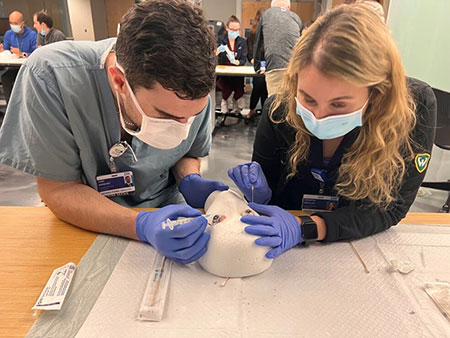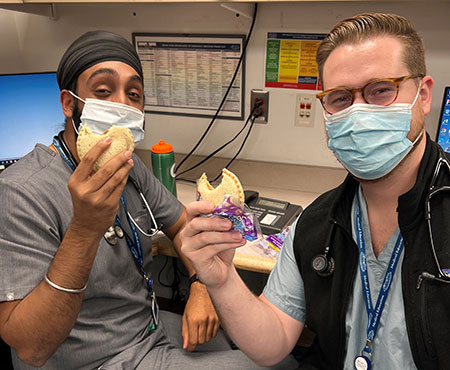Emergency Medicine Curriculum
General Information
Our hospital is on a 13-block schedule, with each block being 28 days. Residents on their dedicated EM blocks work 19 shifts as PGY1s and 18 shifts as PGY2s and PGY3s. Our PGY2s and PGY3s have other education experiences incorporated into this total shift count as explained below. Residents have 4 weeks of vacation during each year.
 On Thursdays, residents have 5 hours of protected educational didactics. Procedural training and simulation are important components of our didactic curriculum, and we are often in our Henry Ford Hospital Simulation Center for didactics sessions.
On Thursdays, residents have 5 hours of protected educational didactics. Procedural training and simulation are important components of our didactic curriculum, and we are often in our Henry Ford Hospital Simulation Center for didactics sessions.
PGY1
This first year is designed to give the resident a foundation for building the knowledge and skills critical to Emergency Medicine by providing clinical experience that emphasizes the recognition, evaluation and management of a broad range of disease processes. The focus is on developing a strong clinical and procedural background in Emergency Medicine, supplemented by specific training in Internal Medicine, Pediatrics, Orthopedics, Neurology, Obstetrics and Anesthesiology. Our hospital is on a 13-block schedule, with each block being 28 days. Residents spend a total of 7 blocks in the ED (orientation, 4 EM, 1 Peds EM and 2 separate two-week EM sub-blocks).
- Emergency Medicine Orientation Block: The first year begins with an orientation block, during which residents are assigned a reduced clinical load in the Emergency Department to allow attendance at lectures, labs and skills sessions. During this block, residents also certify in ATLS, PALS and receive training in essential emergency procedures. This is a great first block to get to know your classmates and adjust to the emergency department and hospital.
- Emergency Medicine: Four blocks under direct supervision of emergency medicine faculty to gain experience in the management and stabilization of medical and traumatic emergencies. Residents work with both adult and pediatric patients at Henry Ford’s Emergency Department. In the 3rd and 4th EM blocks PGY1s will also have 3 scheduled shifts in CAT 1, our high acuity/critical care area of the ED.
- Internal Medicine: One block on the inpatient Internal Medicine Nephrology service.
- Neurosciences: One block on either the Neurology consult, Neurosurgery or NeuroICU services, developing neurological diagnostic and management skills.
- Orthopedic Surgery: This rotation provides a breadth of experiences focused on orthopedic trauma and hand injuries.
- SICU: One block in SICU caring for critically ill patients and learning invasive procedures and monitoring. Residents interested in CCM fellowship may opt to do MICU during this time for earlier exposure and to help meet CCM requirements.
- Obstetrics: One block learning to manage acute problems of pregnancy and gaining experience in labor and delivery.
- Adult Anesthesiology/US/Emergency Medicine: This block is divided between two weeks in Adult Anesthesiology and two weeks in a combined experience in ED ultrasound and Pediatric/Urgent Care Emergency Medicine. When on anesthesia, residents work directly with the faculty, developing the art of endotracheal intubation and the use of sedative and paralytic agents. Residents also work in the Henry Ford Pediatrics/Fast Track area and have dedicated US shifts working one-on-one with EM US credentialed staff physicians and fellows.
- Sports Medicine/Emergency Medicine: This block has one week in a primary care sports medicine clinic, two weeks in the Henry Ford Emergency Department and one week of vacation.
- Pediatric Emergency Medicine (Children’s Hospital of Michigan): One block at Children’s Hospital of Michigan (CHM), the primary pediatric ED of Detroit. Residents are exposed to a variety of presentations of medical and traumatic conditions
PGY-2
In the second year, emphasis is directed toward developing skills necessary for efficient and competent clinical practice, while expanding procedural skills and critical care knowledge. Residents have 4 weeks of vacation during the PGY2 year.
- Emergency Medicine – Adult & Pediatrics: Eight blocks of an integrated adult and pediatric curriculum. During these blocks, the residents work most of their shifts in our Henry Ford Hospital Emergency Department where they have primary responsibility for emergent procedures and gain increasing responsibility for patient care, stabilization and resuscitation. As part of the 18 shifts, residents have:
- 3 shifts per block at the Henry Ford Fairlane Pediatric Emergency Department which sees 35-40k pediatric visits a year in a community pediatrics environment.
- 1 Point of Care Ultrasound scanning shift per block.
- 1 Enhanced Clinical Experience shift in each of the blocks. In 6 of the blocks, these are a community medicine shift working at the adult area of the Henry Ford Fairlane Emergency Department, a free-standing ED. During the other 2 blocks these are asynchronous time to complete Patient Safety/QI activities.
- Adult Emergency Medicine: During your ninth EM block, you have two weeks of Emergency Medicine at Henry Ford Hospital and two weeks of vacation.
- Cardiac Intensive Care Unit: The Henry Ford Hospital CICU provides exposure to patients with advanced heart failure, acute coronary syndromes, arrhythmias, as well as various cardiac support devices such as AICDs, pacemakers, aortic balloon pumps, Left Ventricular Assist Devices (LVADs), etc.
- Medical Intensive Care Unit: This block develops residents’ skills in evaluating, monitoring, and treating complicated critically ill patients while sharpening procedural skills. HFH has one of the largest ICUs in the country and provides an unparalleled educational experience.
- Pediatric ICU (Children’s Hospital of Michigan): The large CHM PICU cares for children with a wide variety of medical and traumatic illnesses, as well as those with congenital cardiac diseases. Our residents have responsibility for patient management and receive training in pediatric critical care procedures.
- Pediatric Emergency Medicine (Children’s Hospital of Michigan): 2 weeks at Children’s Hospital of Michigan (CHM), the primary pediatric ED of Detroit.
PGY3
 The third year emphasizes further accumulation of knowledge specific to Emergency Medicine, while developing leadership skills through increased responsibility for resuscitation, major procedures, patient flow, administrative decisions, and the supervision of medical students. There are 4 weeks of vacation during the PGY3 year.
The third year emphasizes further accumulation of knowledge specific to Emergency Medicine, while developing leadership skills through increased responsibility for resuscitation, major procedures, patient flow, administrative decisions, and the supervision of medical students. There are 4 weeks of vacation during the PGY3 year.
- Emergency Medicine – Adult & Pediatrics: Nine blocks of an integrated adult and pediatric curriculum. Senior residents assume the role of medical and trauma team leader for emergency resuscitations during which they have primary responsibility for the management of critically ill and injured patients. In the 18 shifts each block residents have:
- 3 shifts per block at the Children’s Hospital of Michigan Pediatric Emergency Department, an urban, large volume, high acuity, Level 1 Trauma Pediatric ED. Residents work in a senior level role while in the CHM ED in the critical illness and resuscitation pods.
- 1 Longitudinal Track shift per block. Residents choose their track for the year. Tracks include Administration, Community Emergency Medicine, Education, Street Medicine or Research.
- Intensive Care Selective: Senior residents complete an intensive care experience of their choosing in one of our Medical, Surgical, Cardiac, Neonatal or Neurosurgical ICUs.
- Electives: Residents have three elective blocks in their senior year and may choose from a broad selection of experiences. A few examples of electives include EMS, Ultrasound, Early Intervention Team (ED critical care), Administration, Teaching, Toxicology, Sports Medicine, Community Medicine Hawaii/Community Medicine Jackson Hole. Residents also have flexibility to create their own electives in areas of interest. Recent examples include Palliative Care, ENT, Pain Medicine, Global Health and Indian Health Service
.svg?iar=0&hash=F6049510E33E4E6D8196C26CCC0A64A4)
/hfh-logo-main--white.svg?iar=0&hash=ED491CBFADFB7670FAE94559C98D7798)